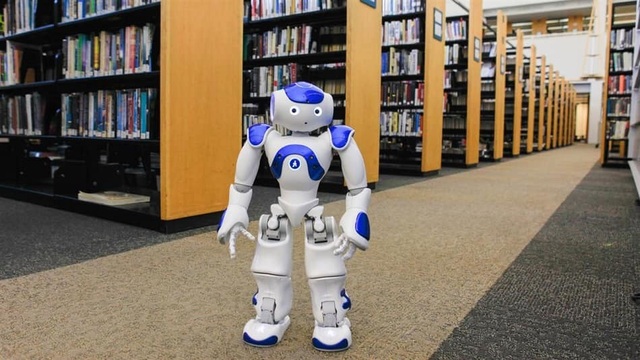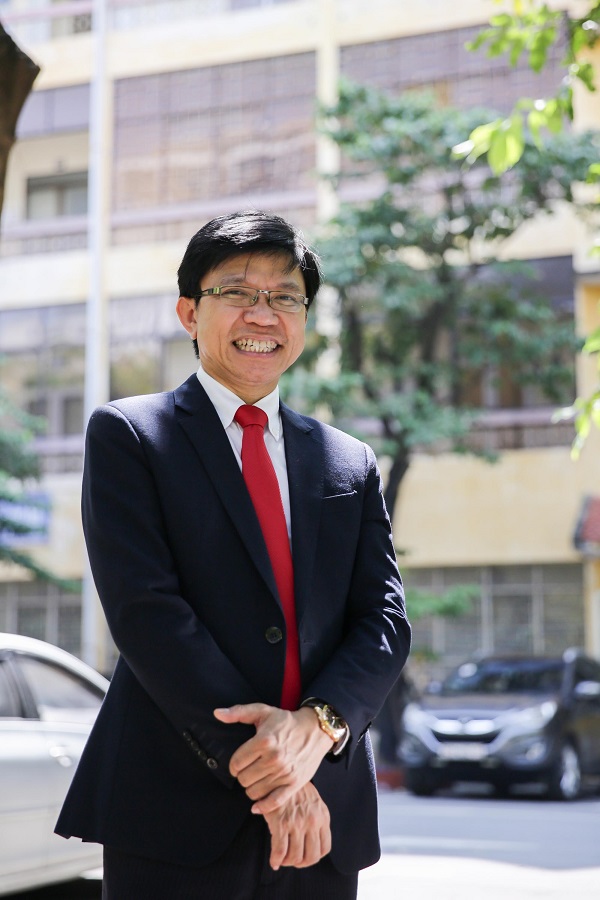
Humans remain at the center of the AI society
Reporter:Artificial intelligence and robots are increasingly penetrating many areas of human life. What do you think about the risks to employment areas in the coming time?
Assoc.Prof.Dr. Hoang Anh Tuan:Robots in their simple form have been present for a long time in some manufacturing fields, becoming increasingly sophisticated, especially on the basis of current research and application of artificial intelligence.
In recent years, in developed countries, robots are not only limited to the manufacturing sector but are also popular in service sectors such as reception, hotels, libraries... Robots have even begun to perform tasks that only humans can do: medical surgery, legal advice, lectures, and sutra lectures instead of monks...
Right in Vietnam, robots have replaced the functions of library staff. Thus, the prospect of robots completely replacing humans in some technical fields is not far away.
A large number of jobs will be completely replaced by robots, especially in simple labor fields. This means that low-skilled labor markets (like Vietnam) will no longer have a competitive advantage in society 4.0.
But that doesn't mean robots can replace every field. No matter how smart and superior artificial intelligence is, it is still just a means to serve humans.
Humans will still be at the center of the AI society, but each individual will have to work harder to keep up with the development of technology.

Robots replace library staff (source: internet)
Education - Training: From STEM to STEAM
Reporter:That means science and technology are playing and will play a big role in the artificial intelligence society. So what is the position of social sciences and humanities in education, training and human resources, sir?
Assoc.Prof.Dr. Hoang Anh Tuan:It is a fact that in recent years, science and technology aspects have been particularly invested in education and training activities in the world in general.
The STEM education model (Science; Technology; Engineering; Mathematics) most clearly represents this trend.
According to 2016 statistics, the countries with the strongest development in STEM with the number of students graduating annually are: China (4.7 million), India (2.6 million), the United States (0.568 million), Russia (0.561 million), Iran (0.335 million)... In Vietnam, the STEM education model has been popular for about a decade, especially in schools in urban areas.
But in recent years, the STEM model has shown its imbalance due to its “technical” tendency. People are moving towards a more balanced and complete STEAM (or STEMA) model. STEAM is simply STEM + Arts (arts, humanities).
With the addition of social and humanities knowledge (philosophy, ethics, history, language, literature, etc.), STEMA's educational and training content becomes more comprehensive and superior, because we all know that any science and technology is built and coordinated to serve people.
The World Innovation Summit for Education (WISE) and the World Economic Forum (WEF) have been hosting many discussions related to the role of social sciences and humanities in the comprehensive development trend of education and careers in the future.
In Vietnam today, many educational institutions from primary to university have begun to pay attention to converting to the STEAM model... This shows that the balance between science - technology and humanities - arts is and will continue to be the prevailing trend of world education in the coming time.

Assoc.Prof.Dr. Hoang Anh Tuan
“Digital Society” requires “Digital Humanities”
Reporter:So the humanities field is being recognized by world education as very important, with many opportunities to develop in the context of the explosion of artificial intelligence society?
Assoc.Prof.Dr. Hoang Anh Tuan:It is true that the fields of social sciences and humanities have very clear opportunities in the overall education and social activities today.
However, opportunities are just opportunities. To turn opportunities into reality, training units need to be determined to innovate, integrate and grasp current trends to be able to meet the very new and very different requirements of the human resources market in the context of the fourth industrial revolution that is changing many professional standards.
Simply put, “digital society” requires a compatible “digital humanities” to be able to develop harmoniously.
Reporter:So what is “digital humanities” and what are the challenges in innovating to capture it, sir?
Assoc.Prof.Dr. Hoang Anh Tuan:Digital humanities is a relatively new concept in Vietnam.
Simply put, digital humanities is a social science - humanities that meets the standards of the current digital age, which requires a breakthrough innovation in harmonizing traditional scientific values with modern, interdisciplinary research methods, applying modern technology, data processing software, etc.
For example, history and heritage conservation apply digital humanities methods to increase accuracy and appeal.
The “Venice Time Machine” project in Italy is a vivid example of the superiority of digital humanities. This project collects and connects all information, documents, cultural heritage… about the city of Venice into an open data repository on the Internet…
In other traditional fields of expertise such as Literature, Languages, Anthropology or Philosophy, the application of digital humanities to research, training and publishing has also produced impressive results.
In fact, rudimentary forms of Digital Humanities have been used by social science and humanities professionals for many years (computers, presentations, graphics, network data…).
However, in the context of the strong development of digital science today, those applications have become too outdated. The reality of the rapid and strong development of digital humanities today forces each individual working in the field of social sciences and humanities to be aware of updating and applying new methods to research, teaching, publishing, etc.

“Venice Time Machine”: a digital humanities project that is more successful than expected, not only in historical value and heritage preservation…but also in promoting tourism (Photo: Internet)
Human resource standard 4.0: replace KAS with KASH
Reporter: TAccording to your opinion, digital humanities is clearly an irresistible trend. So from the perspective of learners, what conditions do students in the field of social sciences and humanities at the University need to meet to be successful in the digital society?
Assoc.Prof.Dr. Hoang Anh Tuan:I had the opportunity to discuss the issue of human resources in society 4.0 and affirmed the importance of the KAS model, which has been widely applied in international labor markets. KAS is a system of 3 main criteria to measure the quality of human resources, including: knowledge, attitude, and skills.
For many decades, higher education in Vietnam has focused on imparting knowledge to students. It must be affirmed that knowledge is of course very important in higher education today.
However, knowledge is only one of the factors that contribute to the success of learners, especially in the context of digital knowledge that has created an environment for self-study and self-exploitation of knowledge that is almost unlimited through open learning resources on the internet.
Along with that, modern career criteria are increasingly interdisciplinary, cross-disciplinary, applying technology and networking... requiring complex skills and high adaptability from workers.
At the same time, having a positive attitude and critical thinking is considered the basis for promoting innovation and creativity on the basis of existing knowledge and skills, and is the driving force for social development.
Recently, world education experts mentioned the fourth element, habits, forming the KASH model, replacing the previous KAS model.
A system of good habits greatly determines a person's long-term success (from daily habits such as tidiness, discipline, exercise habits... to reading habits and lifelong learning).
In some advanced educational systems in Europe and America today, people focus on the trend of educating successful habits (Habits of Success) for students instead of just focusing on teaching knowledge. Experts believe that successful habits will help people learn throughout their lives, adapting to all changes in knowledge and career.
Therefore, I believe that graduates with KASH in hand not only ensure career opportunities in today's competitive and unpredictable labor market, but also have a solid foundation to ensure long-term success.
Universities, therefore, need to grasp this trend to have appropriate training and support strategies for students.
Author:Thuy Duong (VNUMedia)
Newer news
Older news